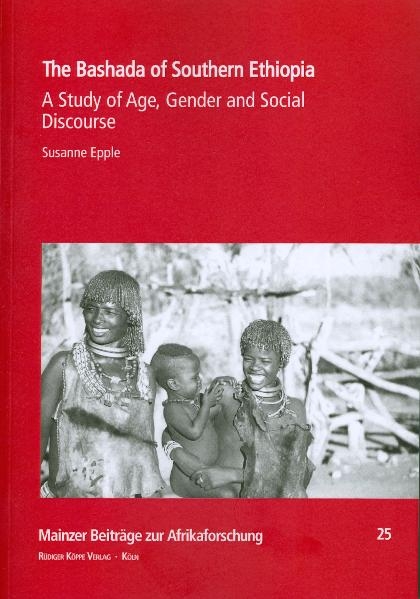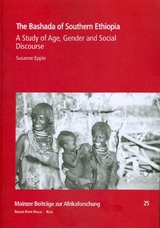The Bashada of Southern Ethiopia
A Study of Age, Gender and Social Discourse
Seiten
2010
Köppe, R (Verlag)
978-3-89645-825-4 (ISBN)
Köppe, R (Verlag)
978-3-89645-825-4 (ISBN)
- Keine Verlagsinformationen verfügbar
- Artikel merken
Unter den Bashada Südäthiopiens werden persönliche Vergehen und Missetaten regelrecht erwartet, besonders wenn diese von Kindern oder Heranwachsenden begangen werden, da Fehlverhalten allgemein als Bestandteil der menschlichen Natur angesehen wird. Um sie davor zu bewahren, sich selbst oder anderen zu schaden, müssen Kinder, Jugendliche und Erwachsene von ihren Altersgenossen und den Älteren beschützt, angeleitet und auch bestraft werden. Da von ungelösten Konflikten angenommen wird, dass sie Unglück bringen und Katastrophen wie Krieg, Krankheit und Dürre herbeiführen, werden gestörte soziale Beziehungen normalerweise durch soziale Sanktionen wieder instand gesetzt.
In der vorliegenden Studie untersucht die Autorin die spezifischen Rollen, die ein Individuum während seines Lebens erlangt oder zugeschrieben bekommt. Sie beleuchtet die speziellen Kommunikationsformen zur Benennung, Bestätigung und Bekräftigung der sozialen Beziehungen zwischen Kindern, Jugendlichen, Erwachsenen und älteren Personen beider Geschlechter. In diesem Zusammenhang wird deutlich, dass die bestehende Altersklassen-Organisation auf alle Mitglieder der Bashada-Gesellschaft Einfluss nimmt. Während die Beziehungen zwischen erwachsenen Männern durch ihre Mitgliedschaft in den verschiedenen Altersklassen klar definiert und Interaktionen zwischen ihnen reglementiert sind, folgen die Beziehungen zwischen Kindern, Heranwachsenden und Frauen auf allgemeinere Weise dem Altersprinzip. Neben einem tiefen Einblick in die aktuelle Wirklichkeit der Bashada, bietet die Autorin eine neue Perspektive auf ostafrikanische Altersklassen-Systeme.
****
Among the Bashada of Southern Ethiopia, individual misdeeds and wrong-doings are expected, especially when it comes from children and adolescents, as it is believed that misbehaviour is part of human nature. To prevent them from harming themselves and others, children, adolescents and adults have to be guarded, and guided, and also sanctioned by their age-mates and seniors. As unresolved conflicts are believed to bring about misfortune and cause disasters such as warfare, sickness or droughts, disturbed social relations are usually mended through social sanctions.
In her research Susanne Epple examines the specific social roles individuals achieve or are ascribed to during their lives. She looks at the specific modes of communication used to articulate, confirm and strengthen social relations between children, adolescents, adults and elderly people of both sexes. In this context, she shows that the existing age-set organisation has an influence on all members of Bashada society. While the relationships between adult men as members of the different age-sets are clearly defined and interaction between them follows certain rules, the relations among children, adolescents and women follow the principle of seniority in a more general way. Besides giving a close insight into Bashada lives, the author offers a new perspective on East African age-set societies.
Unter den nachstehenden Verweisen finden Sie weitere linguistische und ethnologische Beschreibungen Werke zu omotischen Sprachen und Kulturen:
„A Grammar of Hamar – a Shouth Omotic Language of Ethiopia“, ISBN 978-3-89645-491-1.
„Die Wandernde ist eine Kuh – Lebenswege von Frauen in Maale, Südäthiopien“, ISBN 978-3-89645-822-3.
„To Live with Others – Essays on Cultural Neighborhood in Southern Ethiopia”, ISBN 978-3-89645-827-8.
„Predicaments of Mursi (Mun) Women in Ethiopia’s Changing World”, ISBN 978-3-89645-833-9.
„An Annotated Edition of Father G. Toselli’s Dizi Grammar“, ISBN 978-3-89645-490-4.
„Converbs, Medial Verbs, Clause Chaining and Related Issues“, ISBN 978-3-89645-719-6.
„Deictics, Copula, and Focus in the Ethiopian Convergence Area“, ISBN 978-3-89645-293-1.
„Language Contact and Language Change in Ethiopia“, ISBN 978-3-89645-258-0.
„The Wolaytta Language“, ISBN 978-3-89645-040-1.
Dr. Susanne Epple arbeitet zurzeit als „Assistant Professor“ am Department of Social Anthropology, Addis Ababa University, Äthiopien.
REZENSION:
"The present publication obviously follows the tradition of the renowned anthropology department situated at the Johannes Gutenberg-Universität Mainz with its focus on the many ethnic groups of Southern Ethiopia. The research focuses on the Bashada, and, the main attention of the publication is given to the age set formation of this group. Different to former anthropological researches, the author demonstrates the implications the naming of a certain age group has on the political structure or the ritualistic background of the ethnic group, and also its implications on daily interactions. [...] In general the study is very well researched, very well written, and very well theoretically grounded. Its detailed description of structures, its many and rich examples, and its deep analysis of the interconnection of day to day life, political and social life, as well as ritual life are extremely valuable for further researches. There are amazingly few mistakes in the English text and the index is a very useful tool to work with. I can only congratulate the author to the fine work of anthropological research."
(Angela M. Müller in "Aethiopica" 17/2014, 293-295)
In der vorliegenden Studie untersucht die Autorin die spezifischen Rollen, die ein Individuum während seines Lebens erlangt oder zugeschrieben bekommt. Sie beleuchtet die speziellen Kommunikationsformen zur Benennung, Bestätigung und Bekräftigung der sozialen Beziehungen zwischen Kindern, Jugendlichen, Erwachsenen und älteren Personen beider Geschlechter. In diesem Zusammenhang wird deutlich, dass die bestehende Altersklassen-Organisation auf alle Mitglieder der Bashada-Gesellschaft Einfluss nimmt. Während die Beziehungen zwischen erwachsenen Männern durch ihre Mitgliedschaft in den verschiedenen Altersklassen klar definiert und Interaktionen zwischen ihnen reglementiert sind, folgen die Beziehungen zwischen Kindern, Heranwachsenden und Frauen auf allgemeinere Weise dem Altersprinzip. Neben einem tiefen Einblick in die aktuelle Wirklichkeit der Bashada, bietet die Autorin eine neue Perspektive auf ostafrikanische Altersklassen-Systeme.
****
Among the Bashada of Southern Ethiopia, individual misdeeds and wrong-doings are expected, especially when it comes from children and adolescents, as it is believed that misbehaviour is part of human nature. To prevent them from harming themselves and others, children, adolescents and adults have to be guarded, and guided, and also sanctioned by their age-mates and seniors. As unresolved conflicts are believed to bring about misfortune and cause disasters such as warfare, sickness or droughts, disturbed social relations are usually mended through social sanctions.
In her research Susanne Epple examines the specific social roles individuals achieve or are ascribed to during their lives. She looks at the specific modes of communication used to articulate, confirm and strengthen social relations between children, adolescents, adults and elderly people of both sexes. In this context, she shows that the existing age-set organisation has an influence on all members of Bashada society. While the relationships between adult men as members of the different age-sets are clearly defined and interaction between them follows certain rules, the relations among children, adolescents and women follow the principle of seniority in a more general way. Besides giving a close insight into Bashada lives, the author offers a new perspective on East African age-set societies.
Unter den nachstehenden Verweisen finden Sie weitere linguistische und ethnologische Beschreibungen Werke zu omotischen Sprachen und Kulturen:
„A Grammar of Hamar – a Shouth Omotic Language of Ethiopia“, ISBN 978-3-89645-491-1.
„Die Wandernde ist eine Kuh – Lebenswege von Frauen in Maale, Südäthiopien“, ISBN 978-3-89645-822-3.
„To Live with Others – Essays on Cultural Neighborhood in Southern Ethiopia”, ISBN 978-3-89645-827-8.
„Predicaments of Mursi (Mun) Women in Ethiopia’s Changing World”, ISBN 978-3-89645-833-9.
„An Annotated Edition of Father G. Toselli’s Dizi Grammar“, ISBN 978-3-89645-490-4.
„Converbs, Medial Verbs, Clause Chaining and Related Issues“, ISBN 978-3-89645-719-6.
„Deictics, Copula, and Focus in the Ethiopian Convergence Area“, ISBN 978-3-89645-293-1.
„Language Contact and Language Change in Ethiopia“, ISBN 978-3-89645-258-0.
„The Wolaytta Language“, ISBN 978-3-89645-040-1.
Dr. Susanne Epple arbeitet zurzeit als „Assistant Professor“ am Department of Social Anthropology, Addis Ababa University, Äthiopien.
REZENSION:
"The present publication obviously follows the tradition of the renowned anthropology department situated at the Johannes Gutenberg-Universität Mainz with its focus on the many ethnic groups of Southern Ethiopia. The research focuses on the Bashada, and, the main attention of the publication is given to the age set formation of this group. Different to former anthropological researches, the author demonstrates the implications the naming of a certain age group has on the political structure or the ritualistic background of the ethnic group, and also its implications on daily interactions. [...] In general the study is very well researched, very well written, and very well theoretically grounded. Its detailed description of structures, its many and rich examples, and its deep analysis of the interconnection of day to day life, political and social life, as well as ritual life are extremely valuable for further researches. There are amazingly few mistakes in the English text and the index is a very useful tool to work with. I can only congratulate the author to the fine work of anthropological research."
(Angela M. Müller in "Aethiopica" 17/2014, 293-295)
| Erscheint lt. Verlag | 17.9.2010 |
|---|---|
| Reihe/Serie | Mainzer Beiträge zur Afrikaforschung ; 25 |
| Mitarbeit |
Herausgeber (Serie): Thomas Bierschenk, Anna-Maria Brandstetter, Raimund Kastenholz, Matthias Krings, Carola Lentz |
| Zusatzinfo | 1 Karte, 36 s/w-Fotos, 5 Grafiken, 1 Genealogie, 3 Tabellen, Glossar, Index |
| Verlagsort | Köln |
| Sprache | englisch |
| Maße | 170 x 240 mm |
| Gewicht | 610 g |
| Einbandart | Paperback |
| Themenwelt | Sozialwissenschaften ► Ethnologie ► Völkerkunde (Naturvölker) |
| Sozialwissenschaften ► Soziologie ► Mikrosoziologie | |
| Schlagworte | Altersklassen • Familie • Gender-Forschung • Hamar • Hamar/Hamer • Hamer • Interkulturalität • Omotische Sprachen • Siedlungsmuster • Teilnehmende Beobachtung • Verwandtschaft |
| ISBN-10 | 3-89645-825-6 / 3896458256 |
| ISBN-13 | 978-3-89645-825-4 / 9783896458254 |
| Zustand | Neuware |
| Haben Sie eine Frage zum Produkt? |
Mehr entdecken
aus dem Bereich
aus dem Bereich
Schweden : Ambiguitäten verhandeln - Tolerieren als soziale und …
Buch | Softcover (2023)
Brill Schöningh (Verlag)
CHF 69,85
Buch | Softcover (2023)
transcript (Verlag)
CHF 75,60




